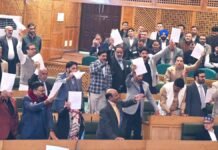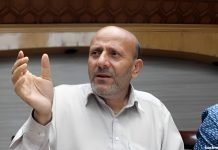October 8 marked the sixth anniversary of the devastating earthquake that hit vast swathes of Azad Kashmir, Khyber Pakhtunkhwa and parts of northern Punjab, leaving tens of thousands dead and hundreds of thousands homeless. Six years on, most survivors still cannot pick up the pieces of their shattered lives and restore a semblance of normality to daily routines.
Survivors complain of a painfully slow pace of reconstruction work – a claim unwittingly supported by Earthquake Rehabilitation and Reconstruction Authority (Erra) in a recently released portfolio which shows just three percent progress during the last year. As per a sector-wise portfolio details, Erra has rebuilt only 59 percent of the infrastructure projects damaged or destroyed by the earthquake. It shouldn’t have taken that long given that the work did not entail building time-consuming mega development projects.
Erra was tasked to complete basic infrastructure projects such as roads, schools, medical facilities, water and sanitation, and electricity so as to make the quake devastated habitations habitable once again. It is moving at a frustratingly slow speed. The completion rate, for example, in health and education sectors is 48 and 40 percent, respectively; in the environment sector, the rate is 47 percent. Out of the seven power sector schemes, just two have been finished, and from among 150 destroyed bridges and roads, barely 77 projects have been reconstructed. Satisfactory progress seems to have been made only in the water and sanitation sector. The total number of planned schemes is 1,938; and 1,894 are ready for service.
The problem is not with slow pace of work only. Gross irregularities have been reported in Rural Housing Reconstruction Programme. 2010-11 report of the Auditor General of Pakistan notes that Rs 3.34 billion were paid to 26,757 households, at the rate of Rs 125,000 each, in two tranches. The report points out that the money was to be released after verification of under construction structures to ensure that the reconstruction was carried out in accordance with the specified seismic-resistant designs.
Physical ground checking was mandatory at all sages of building work. Instead, the auditors discovered that all the households that were paid compensation either did not begin any construction work or failed to meet the required design specification. “To conceal its inefficiency, Erra got the payments written off,” said the AGP’s report. Thus the money has been misspent, and public safety seriously compromised. After the quake seismologists had clearly warned that the affected areas remain prone to high intensity quakes since they lie directly over a tectonic plates’ fault line. The risks are too serious to be ignored. As regards the reconstruction and rehabilitation work, an effective monitoring mechanism is in order. For the other issue, the AGP had recommended a high level investigation to fix responsibility against those who made payments and later got them written off. The recommendation needs to be implemented and its results made public. Such a naming and shaming exercise may act as a deterrent for future wrongdoers.
Survivors complain of a painfully slow pace of reconstruction work – a claim unwittingly supported by Earthquake Rehabilitation and Reconstruction Authority (Erra) in a recently released portfolio which shows just three percent progress during the last year. As per a sector-wise portfolio details, Erra has rebuilt only 59 percent of the infrastructure projects damaged or destroyed by the earthquake. It shouldn’t have taken that long given that the work did not entail building time-consuming mega development projects.
Erra was tasked to complete basic infrastructure projects such as roads, schools, medical facilities, water and sanitation, and electricity so as to make the quake devastated habitations habitable once again. It is moving at a frustratingly slow speed. The completion rate, for example, in health and education sectors is 48 and 40 percent, respectively; in the environment sector, the rate is 47 percent. Out of the seven power sector schemes, just two have been finished, and from among 150 destroyed bridges and roads, barely 77 projects have been reconstructed. Satisfactory progress seems to have been made only in the water and sanitation sector. The total number of planned schemes is 1,938; and 1,894 are ready for service.
The problem is not with slow pace of work only. Gross irregularities have been reported in Rural Housing Reconstruction Programme. 2010-11 report of the Auditor General of Pakistan notes that Rs 3.34 billion were paid to 26,757 households, at the rate of Rs 125,000 each, in two tranches. The report points out that the money was to be released after verification of under construction structures to ensure that the reconstruction was carried out in accordance with the specified seismic-resistant designs.
Physical ground checking was mandatory at all sages of building work. Instead, the auditors discovered that all the households that were paid compensation either did not begin any construction work or failed to meet the required design specification. “To conceal its inefficiency, Erra got the payments written off,” said the AGP’s report. Thus the money has been misspent, and public safety seriously compromised. After the quake seismologists had clearly warned that the affected areas remain prone to high intensity quakes since they lie directly over a tectonic plates’ fault line. The risks are too serious to be ignored. As regards the reconstruction and rehabilitation work, an effective monitoring mechanism is in order. For the other issue, the AGP had recommended a high level investigation to fix responsibility against those who made payments and later got them written off. The recommendation needs to be implemented and its results made public. Such a naming and shaming exercise may act as a deterrent for future wrongdoers.
Follow Us
The Kashmir Pulse is now on Google News. Subscribe our Telegram channel and Follow our WhatsApp channel for timely news updates!










